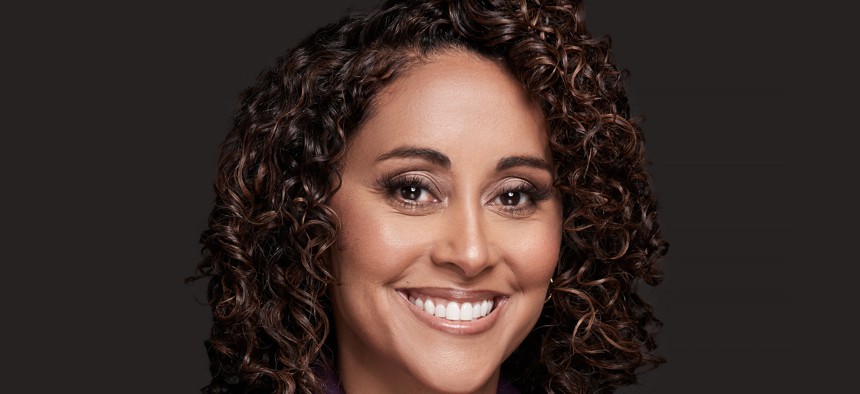Making college readiness accessible after the end of affirmative action
A look at how The Opportunity Network advises students without the legal mandate.

Lucria Ortiz is the CEO and president of The Opportunity Network (Image by Roy Cox Studio)
For 21 years, The Opportunity Network has sought to empower students by helping them build strong academic portfolios and resumes through individualized mentorships, making college and career success a reality.
Through its flagship OppNet Fellows program, over 1,100 high school students across New York City are coached each school year. The fellows program, which takes six-years to complete, guides students on networking and academic habits from high school through college, while ensuring five summers of paid internships to prepare fellows with robust resumes and lifelong support networks. According to the program, 92% of students graduate college within six years of the fellowship, 93% of which being first-generation college grads and 89% of graduates finding employment shortly after.
Lucria Ortiz, who took charge of the nonprofit in January as its president and CEO, is a lawyer by trade who started her career with Bronx Defenders. She later became a law clerk before taking on a private practice. She was most recently president and CEO of the Yonkers Family YMCA. “I am an empowered leader, a relentless advocate and a humble servant. That has been the thread throughout the course of my career,” Ortiz told New York Nonprofit Media.
“I grew up in public housing with a single mom and a father who was pretty much imprisoned my entire childhood. But it wasn't until college that I really wanted to become a change maker. It was in my first year of law school that I felt empowered. Because those of us who are first generation college, once we get in the door, we become the master of initiative. We have all these resources, so we’re like what can we do?”
Ortiz draws from her own experience as a first-generation college grad to support fellow students, who may face similar challenges and culture shocks.
“I think a lot of college students, whether they're first generation, second or third, when they enter the space, they're like, do I belong here? So when you're first gen that feeling is compounded, which can be very intimidating,” Ortiz said. “And that's why the Opportunity Network is key because once students are in those spaces, their mentors and advisors are consistently reinforcing that they belong there.”
The Opportunity Network advisors help students maximize campus resources from career services, special lectures, networking events, to fostering relationships with academic mentors. Ana Alamanzar, New York City’s deputy mayor for strategic initiatives, lauded Ortiz’ appointment to the new role.
“I met Lucria when she was at the YMCA in Westchester, where I attended one of her professional development courses with a room full of women of color, just brown all over. And it was just the best experience ever,” said Alamanzar. “Just the way that she chooses words. And the way that she enunciates every word with so much flavor. Because you know that she's with you all through it. That is just not in passing, but continued building on your own leadership.”
The Opportunity Network foresees expansions across multiple states – growth which Ortiz envisions to be followed by opportunities for intensive feedback.
“We basically have an expansion plan to hit all of the boroughs, and double the amount of fellows by 2030. In terms of our strategy across the country, we're deepening our hubs in each of these spaces,” she said. “So I'm actually going to go on a serious listening tour with our partners to understand and learn what we're doing across the country, so that we can continue to deepen but also innovate in those spaces.”
The nonprofit saw little change in the way it advises students after the Supreme Court struck down affirmative action, according to Emmanuel Moses, director of college access and success at The Opportunity Network.
“We have the privilege that we've been with our young people since before SCOTUS made that decision,” Moses said. They've never been defined by a checkbox, and they never will be. They can talk about anything that's important, but it doesn't detract.”
“The bigger sort of impact is for the young people to unpack the idea that you have to go to a good school or an Ivy League,” Moses added. “But it's not about where you get into - it's what a school can do for you.”
Aside from a few minor tweaks in the ways certain topics are represented in personal essays, most admissions advice remains specific to each student.
“We never ever go by you are first-gen, low income. But if it’s important to them, they have every single right to say that,” Moses told NYN Media. “There’s no checkbox, but our young people can talk about being Asian-American, Black or Hispanic, if it’s important to them. We never want you to fit into something that you think someone else wants.”
